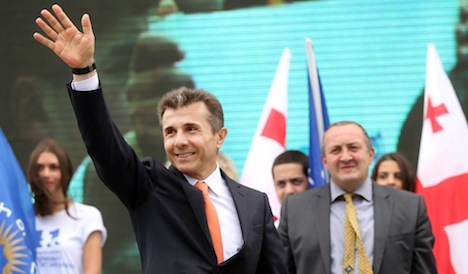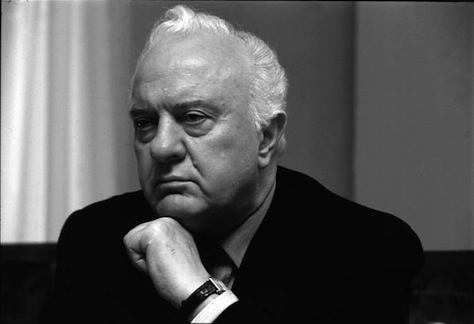
Georgians go to the polls on October 27 to elect their new president — almost exactly one decade after the ‘Rose Revolution’ swept Mikheil Saakashvili to power.
But while everyone expects the candidate of the Georgian Dream (ქართული ოცნება) coalition, former education and science minister Giorgi Margvelashvili, to become Georgia’s next president, Georgian are really waiting to hear the next move of Georgian Dream’s leader and Georgia’s prime minister, Bidzina Ivanishvili (pictured above, with Margvelashvili in background).
That’s because under the reforms passed by Saakashvili in 2010, many of the significant powers of Georgia’s presidency will be transferred to Georgia’s parliament. So when Saakashvili hands over power to his successor, his successor will be more of a figurehead and the prime minister will become the key figure in Georgia’s government.
That will give Ivanishvili political control over Georgia’s government, ending the divided government that’s ensued since the October 2012 parliamentary elections, when Georgian Dream won 85 seats to just 65 seats for Saakashvili’s United National Movement (ENM, ერთიანი ნაციონალური მოძრაობა) in the 150-unicameral Georgian parliament. (In addition, 13 deputies have bolted the ENM since last year, leaving the ENM with just 52 seats today).
Over the past year, Saakashvili retained the power of the executive branch (the new reforms don’t take hold until after the new president is sworn in), while Ivanishvili has controlled Georgia’s parliament. Though one of the highlights of Saakashvili’s decade in power was his graceful concession that his party had lost the 2012 legislative elections, Ivanishvili called on Saakashvili to resign shortly after the election, establishing the tit-for-tat aggression between the two leaders that’s dominated the past 12 months.
Ivanishvili, Georgia’s richest businessman, long ago supported Saakashvili. But a falling-out between the two led Ivanishvili to create his own opposition coalition in 2012 and even Ivanishvili’s dominant win in last year’s election hasn’t brought much in the way of reconciliation between the two. Earlier this week, Ivanishvili said that Saakashvili may be prosecuted after he leaves office — it’s a real possibility, especially considering the imprisonment of Ukraine’s former prime minister Yulia Tymoshenko in recent years.
In the best-case instance, the past year would have provided Saakashvili and Ivanishvili time to coordinate the full transfer of power that will take place following this weekend’s presidential election. But the poor personal relations between the two leader means that Georgia’s transition hasn’t gone as smoothly as possible.
The race for the presidency
Margvelashvili, like Ivanishvili, was a newcomer to high-level Georgian politics in 2012. Margvelashvili came to government from the academic and nonprofit sector. With a doctorate in philosophy from Tbilisi State University in 1998, Margvelashvili served twice as the rector of the Georgian Institute of Public Affairs, a joint Georgian-American institute, from 2000 to 2006 and from 2010 to 2012, after five years with the well-known US-based National Democratic Institute. Saakashvili, missing no opportunity for a snide remark, compared Margvelashvili’s to Caligula’s horse (of all things!) in May:
“I will say nothing specifically about this candidacy [of Margvelashvili], but generally speaking, when the Roman Emperor decided to demonstrate his dominance over the Roman society, he appointed his horse to the senate,” Saakashvili told journalists in Poti where he attended opening of a new Orthodox church.
Recently, Margvelashvili (and Ivanishvili) has claimed that he will end his candidacy if the election goes to a second round (i.e., if no candidate wins a 50% majority of the votes). As Bret Barrowman at The Monkey Cage explains, that seems like less of a sacrosanct promise than either an idle threat or bluster meant to to maximize Margvelashvili’s support.
One helpful goalpost is the previous 2012 election, when the Georgian Dream coalition won 54.97% of the vote nationwide.
While polling in Georgia remains somewhat imprecise, a September NDI poll shows Margvelashvili with a wide lead of 39% to 18% over the UNM’s candidate, Davit Bakradze, a Saakashvili ally and a former foreign minister in 2008 who tried to negotiate a settlement with the breakaway republics of South Ossetia and Abkhazia before the situation escalated into confrontation with Russia. Bakradze subsequently served as speaker of Georgia’s parliament from 2008 to 2012. In third place with 7% is Nino Burjanadze, a former Saakashvili ally who served as speaker of the Georgian parliament from 2001 to 2008, when she formed her own opposition party.
Whither Ivanishvili?
But a more baffling question is why Ivanishvili has been talking about stepping down as prime minister shortly after the presidential election — it’s all the more baffling given that after the presidential election, the prime minister will have most of the powers previously held by Saakashvili: Continue reading Ivanishvili set to consolidate power in Georgia with presidential election →
![]()
![]()



